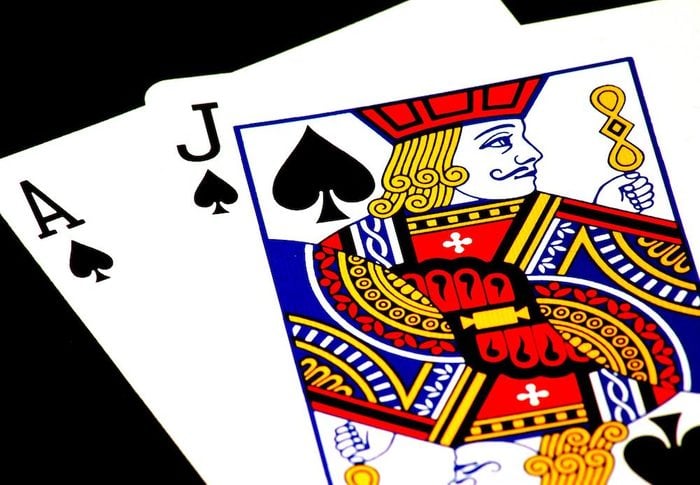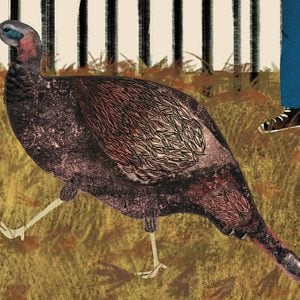In My Family, a Game of Euchre Is Always the Answer

My grandmother loved a good game of cards, and she taught us to play through both love and loss. When she died, I played to remember her.
My grandmother loved euchre so much that we dropped a deck of cards into her casket. “Deal us a hand, Beth,” my grandfather said. In spite of our grief, we laughed. She would have laughed, too.
Euchre (pronounced you-ker) runs deep in my family’s history. When I was growing up in New Brunswick, the only people I knew who played were my mother, my grandparents and the friends they had converted.
My grandparents had two homes: the one they built for their retirement in the New Brunswick village in which my grandfather had grown up and the one in Toronto where they raised their children. They divided their time equally between provinces and drove back and forth every other month.
In my grandparents’ home in New Brunswick, the 24-card deck and scoreboard were brought out as soon as the dinner plates were cleared. We played over strawberry shortcake and wine, both homemade. When in Toronto, my grandparents hosted dinner and euchre on Tuesday nights, opening their home to family and friends. I lived with them while attending university, and it was during those Tuesday-night games that my love of euchre flourished.
Playing the game is a rite of passage for members of my family. I learned to play through trial and error. Euchre has variations, but the central rules are simple. Four players split into teams of two. Everyone gets five cards, and once the trump suit has been determined through bidding, each player throws down one card, face up, in turn. The team with the highest-ranking card wins the hand, or “trick.” Points are earned by the team that wins the most tricks. If your team called trump but fails to win the most tricks that round, the other team is deemed to have “euchred” you—and earns double points. The first team to reach 10 points wins the game.
Euchre is fun to play even if you aren’t that great at it. The games don’t drag on forever, either, so you can play for as little or as long as you like. It can be excellent for socializing—or, if you join our group, for friendly trash talk. At times, a gutsy move with no chance of winning will earn you a “Lord hates a coward”—a direct quote from my grandfather’s late cousin, Aunt Elsie.
When my mother was battling breast cancer, my grandmother worried that her chemotherapy treatments would make her too sick for euchre. “Mom, I could be dying, and I’d still be playing,” my mother told her. “Oh, me too,” my grandmother replied.
Years after my mother went into remission, my grandmother maintained the same attitude when she herself was diagnosed with end-stage lung cancer. In the weeks before my grandmother died, my family gauged whether she was having a good day based on how many games she could fit in. We slowed the pace of our games as her health declined and played every round knowing it could be her last. She was 84 years old and had smoked for most of her life. We knew we were going to lose her, but we still couldn’t envision playing without our matriarch at the end of the table.
Euchre night was suspended after we lost my grandmother. For a long time, my family felt disjointed. Their home in Toronto was eerily quiet in her absence. The Tuesday-night crowd visited my grandfather regularly, but the card deck and scoreboard remained in the cupboard. Having moved elsewhere by then, I dreaded coming back to the house they shared with me for two years. Walking into the kitchen and not seeing my grandmother at the table was too painful.
It was four months before we played another Tuesday-night game. Every member of the usual group made sure to be there. We took extra care to help set out dinner and wash the dishes, but our actions felt awkward and strained. Then the cards came out, and I took my grandmother’s seat—sitting there made me feel close to her. After the first few rounds, we began to ease the tension by imitating her. “Dammit,” someone said when a play didn’t work out in their favour. Everyone smiled. For the rest of the evening, we brought up our favourite one-liners of hers, like “wouldn’t that frost you.”
It has now been more than six years since my grandmother died. Those who attend Tuesday-night games continue to do so in the same way devout Christians attend service. We have played through illnesses, arguments, divorces and death. Euchre has held us together and helped us heal. These days, my boyfriend joins us if he’s free. When my mother learned he played euchre, she told me to keep him around. Just like that, the circle grows.
© 2020, Jessica Myshrall. From “How Euchre Healed my Family,” The Walrus (March 2020), thewalrus.ca
Next, read about a widow whose children made a quilt for her—out of their father’s old clothes.






